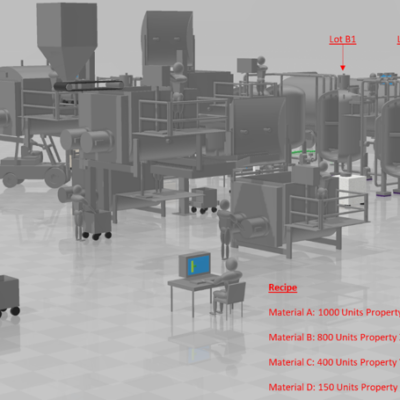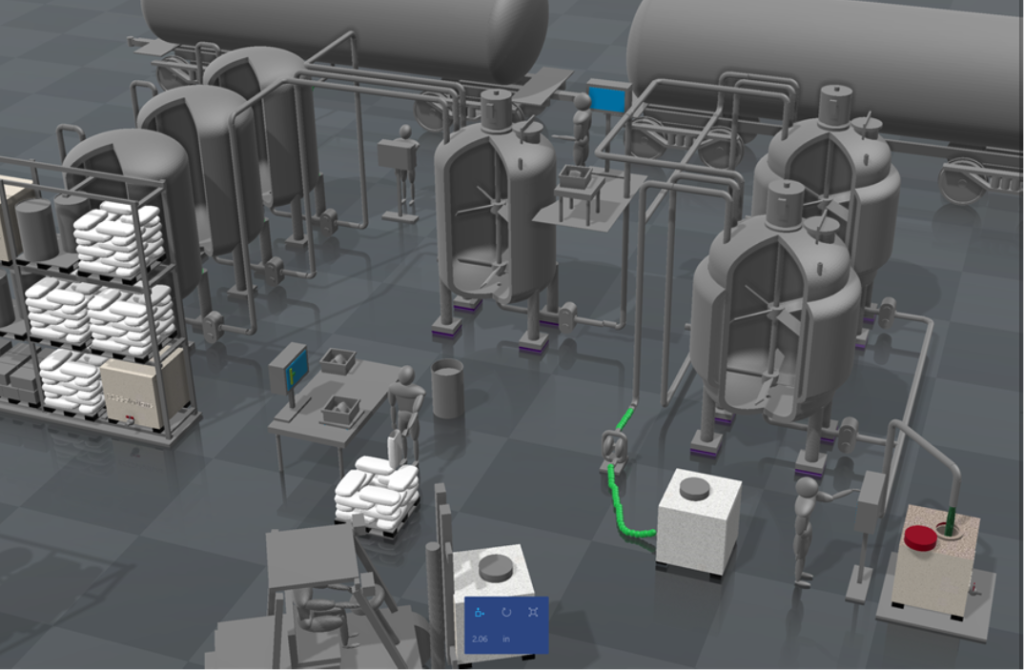News

ECS Delivers True Long Term Success as Trusted Advisors
People and organizations leverage trusted advisors in all facets of life. Whether it is something as commercial as an auto mechanic or as intimate as a primary care physician, attorney, or wealth advisor, trusted advisors play a role just about everywhere. They maintain deep, current knowledge in specialized fields, and they stand ready to support those in need. They are driven by excellence, thinking beyond themselves or their own organization and focus on the broader environment. Where their focus intersects with the needs of a client, a true trusted advisor relationship can take hold.
Control systems integration is young but maturing when compared to many other functions in legacy buildings and operations. The discipline, which barely existed a generation and a half ago, has become the technological focal point of modern manufacturing. There are no lulls or definable steps as technology continually advances at a dizzying pace. What started as ways to simplify wiring and logic applied to flexibility in controls has evolved into a holistic environment which links manufacturing, operations, and supply chains via a web of connected people and equipment. Manufacturers leverage related professionals each day to stay at the edge of technology and to apply it effectively.
ECS Solutions (ECS) has been around since the dawn of the systems integrator-for-hire concept. Our success has been driven by working collaboratively with our clients as true strategic partners. We know that enduring bonds do not develop by accident nor out of contractual obligation. Our clients expect that we know not only where technology is today, but also where it is going. They leverage our extensive knowledge and experience in ways that address both their immediate needs and their continuing objectives.
Read More | Posted In: Bakery Industry, Beverage Industry, Blogs, Chemical Industry, Consumer Goods, Distilleries, Food Industry, Life Science Industry, Metals Industry, News

Ignition Perspective® Module
Human-machine interface (HMI) vendors have been promising a utopia based around web-based technologies for over two decades. The prospect of simply providing a web address to anyone within an organization that leads to a fast-loading, full-power supervisory control and data acquisition (SCADA) system has been on most factories’ wish list for a long time. After all, internet page tools and functionality have far outpaced advancements in SCADA software over the same time. The advancements seem to leap forward every time someone reloads a page, with new widgets and tools available almost daily. When coupled with hardware developments like high contrast screens; enhanced touchscreen operations; and capabilities like Bluetooth, accelerometers, geolocation, and more; a flexible, web-based option has been coveted.
What many casual users fail to understand about HMI solutions is exactly how tightly the software is connected to the factory floor controllers. This connection via high-security networks, VPNs, and masks, can be tricky to navigate, particularly when the architecture is intentionally complex to provide security for the systems. Further, most people don’t realize the architectural complexity of software that link to sometimes multiple databases and remote data sources, where gigabits of proprietary information streams into and out of the SCADA application. It has been the responsibility of the integrators of these solutions to protect would-be users from themselves in a lot of applications. Poorly developed programs could create vulnerabilities to the operation of equipment, expose floor workers to potential risk, and possibly allow trade secrets to escape into cyberspace.
Read More | Posted In: Bakery Industry, Beverage Industry, Blogs, Chemical Industry, Distilleries, Food Industry, Inductive Automation, Metals Industry, SCADA

DVR Module for Troubleshooting and Continuous Improvement
Effective mass production manufacturing operations involve both monitoring of production processes and continual improvement. ECS Solutions, Inc (ECS) has developed an innovative, powerful tool to help their clients develop peace of mind that their products are being manufactured accurately and efficiently while providing a platform to easily improve future interactions. The Process DVR tool satisfies the modern expectation that anything that can be observed visually should be recorded and easily viewed later. When used effectively, the result is truly optimized production control where the best-trained operators deliver accurate results with the least possible waste.
Data Historian capabilities have been built into many vendors’ SCADA systems for a long time. Astute process engineers can call up trending information that illustrates the states and conditions within an automated system, the multitude of lines crisscrossing an HMI terminal in a way their trained eyes can discern. This is an excellent tool by itself, provided that an operation has personnel who are trained to read and interpret the cryptic information that is returned from a standalone Historian. ECS believed that this was conceptually sound but that a more manageable solution would help to bring wider benefits to their processing clients.
Read More | Posted In: Bakery Industry, Beverage Industry, Chemical Industry, Clean in Place, Digitalization, Distilleries, Food Industry, Inductive Automation, Life Science Industry, SCADA

Batch Forensics: The Case for Procedural Unit Tags
A Unit Tag is a class-based tag that identifies a characteristic of a unit.
The values of these tags are usually associated with information captured via the control systems analog and digital Input cards, signals like Temperature, Weight, Pressure, Level, Conductivity, pH, Level Switch, etc. Other unit tags can contain the status, state, material of construction, or any other user-defined attribute that can enhance the recipe editing capability and execution.
Read More | Posted In: Bakery Industry, Beverage Industry, Distilleries, Food Industry

Batch Forensics by ECS Solutions
The term forensics refers to the application of scientific knowledge to problems, especially scientific analysis, and data analysis of physical evidence. In a plant environment, data and scientific analysis can be the key to discovering opportunities to improve the automation solution that exists, forensic tools can be implemented in all phases of the life cycle of a system, but ideally, they should be considered during the design phase.
Read More | Posted In: Bakery Industry, Beverage Industry, Blogs, Chemical Industry, Distilleries, Food Industry, Life Science Industry, Metals

Dosing Materials Based On Their Properties
Improving Product Quality
Often the quantities of materials required to manufacture a product are specified by weight or by volume. Recipes and procedures are created to specify the activities that need to be performed and the number of materials required.
The Setpoints for these quantities are set in the recipes based on the materials that are being used, if the material properties change significantly then these recipe quantities need to be updated once the new materials enter the production stream. This often requires tracking the material consumptions and updating the recipes at the appropriate time. i.e. late at night on Saturday once the new material is introduced to the production environment.
These new formula quantities are calculated after a lab analysis is performed of each Lot sample. The timing to introduce these new recipe parameter values can be critical to the Quality and the Cost of the product.
Read More | Posted In: Bakery Industry, Batch Boosters, Beverage Industry, Chemical Industry, Distilleries, Food Industry, Life Science Industry, White Papers

Documenting Your Manufacturing Ecosystem
Understanding your manufacturing ecosystem is one thing, but documenting it is just as important. Having extensive documentation of the manufacturing ecosystem, helps those who aren’t involved in daily, plant-floor operations make informed decisions. Your manufacturing ecosystem is the system you use for making your product(s), and fully documenting and understanding this ecosystem will help the decision-making process of your organization.
Read More | Posted In: Bakery Industry, Beverage Industry, Blogs, Chemical Industry, Distilleries, Food Industry, Life Science Industry

Material Dosing Geneology
The Food industry uses batch manufacturing extensively and therefore requires traceability for material ingredients, i.e. the ability to follow the movement of a food product and its’ constituents all through the production process.
This capability not only largely prevents unsafe foods from reaching the consumer but also improves product quality and efficiency in the event of a recall.
Read More | Posted In: Bakery Industry, Batch Boosters, Beverage Industry, Chemical Industry, Distilleries, Food Industry, Life Science Industry, White Papers

The Benefits of Off-The-Shelf SOP Management Software
Being able to keep track of every step and every bit of data is a major necessity for every organization. An off-the-shelf standard operating procedure software is one way to implement new processes and keep track of business operating standards.
Tracking manual operations in discrete, batch, and continuous manufacturing processes can greatly benefit from off-the-shelf products. Clearly specifying your procedures, enforcing their execution, and capturing pertinent data are all major benefits that can be quickly and easily be obtained by implementing off-the-shelf, procedure management software.
Read More | Posted In: Bakery Industry, Beverage Industry, Blogs, Chemical Industry, Distilleries, Food Industry, Life Science Industry

Bardstown Bourbon Company Case Study
The Challenge
Bardstown Bourbon Company (BBC) is a Bourbon Distillery located in Bardstown Kentucky. Utilizing two mash cookers, 32 fermenters, two distillation stills, and nine cistern holding tanks, BBC produces a wide variety of high-quality whiskeys and bourbons. (more…)
Read More | Posted In: Case Studies, Distilleries, Inductive Automation

